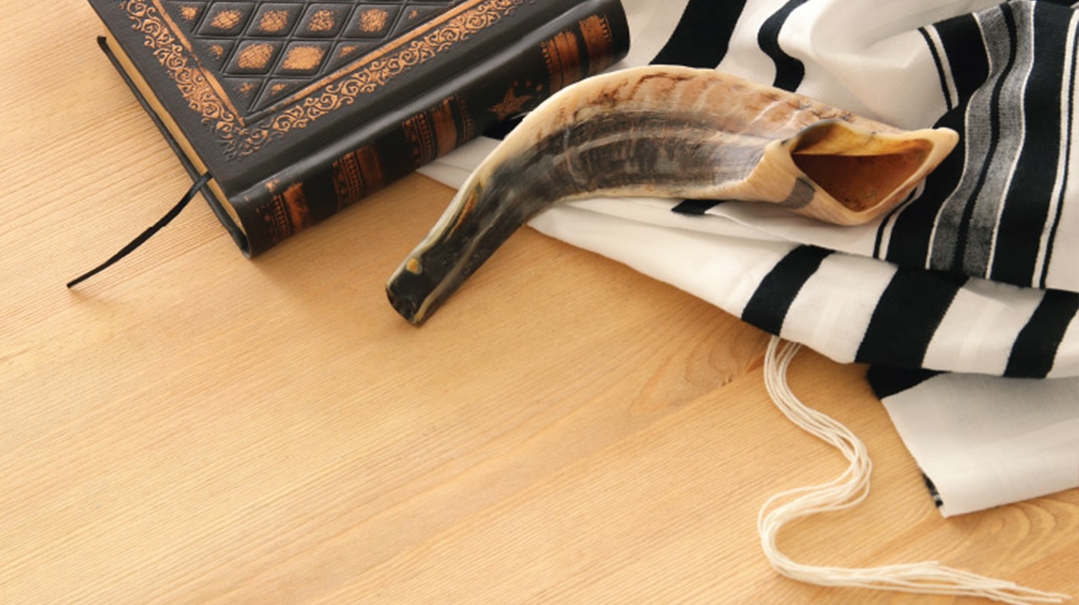Finding My Voice


Avromi is standing at the door of my childhood bedroom, car keys in one hand, the Maxi-Cosi in the other. “Finished?”
“Just looking for my old machzor.”
Right next to my Clep Biology textbook, my ArtScroll machzor stands upright, a faithful friend throughout the four long years I leaked makeup into its pages. Now it’s been granted a reprieve, sitting primly in my former room, a little island of pink in a house of blue.
Avromi didn’t imagine I’d want an ArtScroll machzor. He meant well, with his white leather-bound set. He just didn’t know about the relationship I had forged with my blue machzor, standing in shul as a desperate single, mature enough to want to really understand what I was saying. I pull it down from the shelf and close the light. “Kay, I’m ready.”
“I see you’re planning on davening a lot this year.”
“Hoping. Last year I was busy throwing up. This year I can actually daven.”
We walk down the hallway and into the kitchen. My mother is in a robe and lavender turban, loading the dishwasher. She looks up.
“That’s it, you’re going?”
Oh, the guilt of an only daughter. You feel bad when you’re single and making them wait. You feel bad when you’re married and leave them all alone.
I sigh. “Yeah. Avromi has night seder soon.”
We stop by the dining room where Leizer and my father are in heated discussion.
“Nu. So that’s exactly what I did. I only went up at the end of hayom.”
“No.” My father’s voice is mild, but I can hear the veiled impatience. “You went up too much at the end. Listen to how he stretches the second-to-last note.”
He fumbles with the buttons, but Leizer waves his hand. “I got it. Okay, this is what you mean.”
His beautiful baritone, like polished mahogany, fills the dining room. When he sings like that, I forget the voice belongs to my brother, his jacket thrown over the chair, a pile of pistachio shells hugging his empty glass of Coke. I just see a chazzan.
I watch Avromi’s face as Leizer sings.
He seems impressed, I think. I hope.
Leizer finishes with a flourish. “Better?”
My father nods. “Yes. Good.”
Avromi smiles. “Wow. Really beautiful. I’m mamash looking forward to hearing you.”
Leizer salutes him in thanks.
My father pushes his chair back and walks over to us. “Sorry I didn’t greet you with more kavod.” Avromi smiles but his eyes darken. He can’t take the fawning, the way everybody treats him like a hero. He says it’s like he stepped into a warm family picture and everybody just froze with fake smiles.
“It’s mamash a joy for me to see you both. We love when you stop by.” My father pats him on the shoulder but Avromi is stiff.
We walk to our car.
“He’s amazing, Leizer, no? All of my brothers, actually.”
Aromi nods a little too quickly. I freeze for a second and look at him again. He’s humming as he buckles the car seat and closes the back door. Maybe I imagined it.
Still, I caught a look of something on his face. Something, but I’m not sure what. Did my father say something wrong? Did Avromi find last Rosh Hashanah overwhelming? Does he think we’re nuts that we hold our own minyan in the country?
I know Avromi misses his yeshivah davening. On the other hand, Tatty’s Mussaf is legendary, and my brothers are the real thing. There are 22 other families who come up every year, shlep their food, and rent the surrounding bungalows, just to hear the Kaufmans daven. And they’re pretty normal people.
I try to sound casual as he pulls out. “You know that Aizik is coming back this year?”
His eyebrows go up. “Really? Nice.”
“Yeah. You know that he had the job at the Lincoln Square Synagogue? Years ago, before his surgery?”
“Takeh, Lincoln Square?” He moves into the right lane.
“Yes. Last year, Leizer was so nervous when he heard he was coming. He practiced like crazy. But I guess we passed.”
I wait for Avromi’s little laugh.
It doesn’t come.
His face is creased in thought as he stops at a red light. He reaches into his jacket pocket and pulls out something. He tears open the wrapping, but then the light turns green, so he drops it onto my seat.
It’s a disc. A double album. Golden Voices of Israel.
“Want to stick it in?”
I stick it in and listen to the static before Koussevitzky’s voice fills our little Honda.
So I was right. We’re intimidating. He’s brushing up on his knowledge of chazzanus so he shouldn’t feel unenlightened around us this year. Poor Avromi.
He’s singing along. He’s no Koussevitzky, nor is he a Kaufman for that matter, but he’s fine enough. Honestly, I didn’t need someone like my brothers, but I couldn’t have handled someone who was tone-deaf. Or worse, the type who thinks they’re better than they are and belt out bad harmonies with too much confidence.
He’s tapping on the steering wheel. His sense of rhythm is okay, his voice is pleasant enough. Every so often he tells me how he used to daven from the amud in yeshivah, how he could “k’nak away” a Shacharis. I can picture him swaying with his eyes closed, changing keys in mid-song when he realized he started too high. And he wouldn’t feel bad about it either, wouldn’t rehash the way my family does — “You naar, what were you thinking to start Keil Adon on a G?”
A new song crackles to life. Now it’s Kwartin. I know these pieces in my sleep. It’s what I heard every summer growing up, my father and Tzvi Eli and Leizer and Moishy going back and forth, repeating the kneitches.
Avromi’s singing along, but his expression is intent, almost as if he’s listening critically to himself.
Gosh, are we that scary? Does he think someone’s going to test him on Rosenblatt’s “Hineni”?
The song ends and he turns to me. “Nice?”
“Very.” My poor, intimidated husband. “You know I love hearing you sing.” It’s true. It’s a nice change from the singing in my house that reeks of perfectionism and lacks the modest candor of Avromi’s thin voice.
“Think I could do it?” He’s steering with one hand.
“Do what?”
“Daven. Daven on Rosh Hashanah.” He’s trying to sound nonchalant, but I see his eyes glint.
Oh my goodness. He wants to daven this Rosh Hashanah.
“No, your father didn’t think I was crazy at all.”
I manage a strangled sound. “Okay, good.” I put on my dumb, perky face, the one I used when I was pulled over by a cop for speeding.
“How did you ask him?” Of course, I’m only asking because I want to make sure his father-in-law was nice to him, not because I’m shriveling with shame, picturing my father’s amused response to his wonderfully sincere, wonderfully amateur son-in-law.
“I just told him, ‘Shver, it’s such a zechus to daven with the family, and I know the boys switch off every year. Do sons-in-law get a turn at the amud, too?’”
“And?” I’m breathing through my nose.
“And nothing. He laughed and said ‘Well, I don’t see why not.’ That was it.”
My heart is pounding. “So you’re doing a Minchah?”
“Nope. I will G-d willing be leading the Shacharis services on the second day of Rosh Hashanah.” He gives a gentlemanly nod.
I make some sort of sound and find my perky smile again.
It’s at times like this that I dream of a sister. I know, I know, not everyone shares everything with their sisters, but still. I’m not exactly sharing this with my mother; I wonder if she even senses my anxiety over this. Tatty, I’ll never know what he’s thinking.
The only one who can see right through me is Leizer; the brother a year above me, my confidante all through our years growing up together.
But Leizer is not the one I can share this with. No way. Now, I am loyal to the new man in my life. Even if that new man is acting rather unmanly, in my opinion.
I call my sister-in-law Elky. She’s safe.
“Suri, I want to tell you something. Tzvi Eli, when we got married, was not the Tzvi Eli you see today. I know Tatty likes to take the credit, but Tzvi Eli was majorly insecure. He wouldn’t open his mouth at my parents’ table.”
“Really?”
“Yes, I had to beg him to sing at the Seder. You would never believe it, right?”
“No. Never. He has like, what, 400 people who come to hear him now?”?“Mmm hmm.” Elky’s voice is triumphant. “I’m telling you from experience, husbands needs patience. And confidence. Don’t crush him.”
“Yeah,” I sigh. “But it’s not the same. Tzvi Eli had a great voice, he was just shy.”
She’s quiet for a second. “Well, how do you know Avromi won’t become great with the right wife?”
“I don’t. But he’s no Tzvi Eli, that much I know.”
“Well, not if you don’t give him a chance.”
Someone’s beeping in so I thank her and hang up, grateful to escape the suffocation of being misunderstood. It’s Mommy. She wants to know where the Costco card is. Leizer is practicing in the background. I tell her to check behind the Mac.
She calls over his voice, “Suri says behind the computer.” Leizer stops in mid-song. “Oooooh, the choshuve wife of the world-famous chazzan. Tell her we’re waiting with bated breath.”
My face gets hot. He doesn’t mean to, but he’s humiliating me.
Rub it in my face, that my husband is about to make a royal mess of everything. Leizer knows I’m not dumb. He’s nervous for me, wondering what I’m making of all this. But I will not let him in, will not breathe to him how much I wish the disc on the table would get irreparably scratched.
Mammy puts a huge bag of mangoes onto the counter and asks me to cube them. She has this thing about fresh fruit. I’m the daughter, the one who gets the jobs.
I see Aizik and his wife coming up the path. I laugh inwardly at how they think we’re a Yom Tov hotel — they did the same thing last year, came over after they arrived for coffee and cake as we scurried around unpacking.
Moishy opens up for them and greets them warmly.
“Ah, such choshuve guests. What a kavod.”
Aizik nods magnanimously. “The kavod is ours. We’re gearing up for a performance!”
I swallow hard.
Leizer walks in with two kids. “Is there kugel?”
“It’s not warm yet,” I say without turning around.
“Hmmm. Okay, kinderlach, what should we eat?” He heads toward the living room fridge and emerges with chocolate lebens. He seats his kids at the crowded table.
Aizik’s telling everyone about the herbal supplement he used to take for his voice until the doctor made him stop singing. Leizer nods in recognition — yes, he takes it too and thinks it helps, but he’s only davening one Shacharis this year as opposed to two. I’m cubing the mangoes with unusual concentration.
“Really, only one Shacharis? Who’s doing the other one?”
My ears get hot. “We have a new name this year in the lineup.” Leizer’s voice rises with a flourish. “This year Suri’s husband is going to be mechabed us.” All eyes are on me. I turn around and give a tight smile.
“Psssshhhhh.” Aizik shakes his head back and forth. “Nu, I’m getting ready.” I smile again and dump the peels into the garbage.
“Checking on my baby. Enjoy, everybody.” I’m out the door.
But I don’t know where to go. Avromi is watching a sleeping Esti, sitting at the dining room table, hard at work. I can’t hear it. For three weeks now, night after night, I’ve been listening to a sub-par chazzan engaged in fanciful self-delusion. I know my father was overcritical of my brothers — but who in the world gave Avromi the idea that he could sing? I picture my in-laws’ noisy, relaxed Shabbos table with the never-changing, mediocre harmonies, and I get upset at the smiling woman who convinced everyone that they could do anything they wanted.
I need space. I head toward the parking lot, hoping the car door will be open. My keys are in the bungalow and I’m not going back.
It’s open. I adjust the seat and instinctively flip down the mirror. I look strained. I pick up the stray garbage — the white straw wrapper, a parking stub, a dirty cup. It’s my car, my space. I can nurse my feelings in privacy here, caress my confusion in silence. I feel so alone. I can’t share my feelings with anyone — not Mommy, not my sisters-in-law, for sure not Leizer. He’s only too eager.
Once upon a time I shared things with my husband, looked at him as a source of wisdom and strength. He was the smart, capable man who had elegantly rescued me from singlehood, who’d received approval from my picky brothers, who’d surpassed everyone’s expectations even though he came from a family so unlike ours.
I am angry at him for ruining all that.
I slam the car door closed and head down the lawn, my gait heavy. Then I freeze. The Pollaks are sitting in the gazebo, waving warmly at me.
“Suri, we were just discussing you. Unbelievable, that your husband is taking such a big step. It’s a real milestone.” Mrs. Pollak’s eyes are big, her voice drippy.
“Yup.” I draw it out slowly and evenly.
Aizik is eating cashew nuts, one at a time. “Does he have formal voice training? Studied chazzanus ever?”
Leave me, leave me alone, everybody.
“Um, no, not really formal training. I mean, he’s not like a real chazzan or anything. Just a nice baal tefillah.”
I’m pleasantly surprised at my answer. I’ve never had to defend him before and I’m relieved that’s what came out of my mouth.
But I’m also sad. I’m sad to have to defend my husband, to conceal his glaring immaturity and incompetence. There’s a bitter taste left in my mouth.
“Very nice. I like how you put it”— there’s something overly jovial in his voice that feels condescending— “just a nice baal tefillah. Those are the best ones. Nice, and simple, and from the heart. The best ones.”
Yeah right, like he believes it.
“It’s carrot-leek soup. Rivky made it. Two simanim together.” Mommy’s handing out bowls from the oval tray.
“Ma, the baal tefillah needs more soup.” That’s Leizer’s voice.
“Who? What?” Mommy looks up.
“Avromi’s coming down with a cold. He told me he has a sore throat. I’m ordering a second bowl for him, if you have enough.”
“Sure, of course we do. Oh no, that’s not funny.”
My father looks up with a jolt. “For real? You have a cold?”
Avromi colors at the attention. “Nah, I’ll be fine.”
I don’t want him to be sick. But maybe a sore throat is not such a bad thing.
Leizer’s davening is beautiful. I hear the hours of practice behind the rise and fall of his voice, I detect the indiscernible breaths between words, I appreciate the way it comes together: fluid, flawless.
But I can’t daven. It’s Rosh Hashanah, and there’s so much to daven for, but I have zero emotion in me.
Stella’s watching all the babies, I should be able to lose myself in the swell of voices around me, but I’m frozen.
I mouth the words, run my fingers over the pages where hot tears once made them bumpy. Where am I now? Finally ensconced in a beautiful marriage… then why do I feel so disjointed? Why can’t I find that voice, the one that drew a line from the pages in my hand to my heart?
Mammy has ordered honey cake for the Kiddush. Avromi’s not going to eat before shofar, but insists that I do. Leizer’s making Kiddush, his voice tired but happy. I wait until there’s a crowd around him so that I can deposit my compliment and run. I wave from a distance. “Beautiful, Leizer. I enjoyed every word.” He nods and smiles.
Avromi walks over, sparkling atarah draped over his shoulders.
“Gut Yom Tov, Leizer. What a davening!”
Leizer pumps his hand. “Shkoyach. Looking forward to yours.”
“Ach, I’m embarrassed to daven after you.”
Yeah, but not enough.
Leizer just chuckles.
Esti’s falling asleep as we walk back after the seudah, Avromi is blowing his nose. And for the first time since we’re married, I feel a gaping distance between us, almost as if he’s a stranger. I don’t understand him at all. In just a few hours, he will stand in front of a quiet shul, and I don’t know where I will put myself. He double locks the front door and moves Esti to our room.
I hear her whimper as he transfers her to the Pack ’N Play. I’m exhausted. He’s patting her, saying “shh.”
I didn’t say he wasn’t nice, or that he doesn’t make a good father, but that does little to dispel the dread I feel right now.
There’s a light knock at the door. I open to find Leizer standing there, beads of sweat on his forehead.
“Gut Yom Tov, Suri. Avromi’s around?”
“He’s settling Esti,” I whisper, not opening the door wider.
“Um, okay. So then I’ll give you the message. Okay, so like this.” He exhales. “Um, I know Avromi has a cold and might be nervous about davening tomorrow.”
I carefully keep my face neutral.
“So I wanted to tell him that he should feel zero pressure. I can step in for him, Moishy can do it too, we’re not the Lincoln Square Synagogue where he can’t back out.”
I shrug, as if I couldn’t care less. “Sure thing. I’ll tell him.”
He looks at me through narrowed eyes. “Are you nervous for him?”
“Nervous? I don’t know. I mean, it’s a big responsibility, but why should I be nervous?” Moths dance around the little bulb outside, and he searches my face in the light.
“Nah, okay, good. Nothing to be nervous about. He’ll be great.”
“Yeah, I’m sure he will.” The moths are oblivious to the stagnant air. They charge at the light bulb while we keep our muscles stiff.
“It’s very brave of him, no?”
I suspect brave is a euphemism. I smile back without really looking at him. “Yup. He’s brave, my husband.”
Avromi comes out then, squinting from the darkened room. Leizer looks disappointed, like he wanted to say more.
“Ah, gut Yom Tov, Leizer.” Avromi looks at him questioningly.
Leizer leans against the grey siding. “I just wanted to tell you that there’s no pressure to daven tomorrow — I see you with your tissues, I know you’re under the weather.”
Avromi’s brow furrows. “I shouldn’t daven?”
“No, chas v’shalom, I didn’t mean that. I mean that if you want to back out for whatever reason, don’t be worried. You can even let me know in the morning.”
Avromi nods slowly, his expression guarded.
“You’ll be great,” Leizer quickly adds. “I didn’t mean to tell you not to daven. Aderaba, we’re waiting to hear you. Just want to make things easy for you.”
Avromi smiles.
Leizer waves and walks along the dirt path. Avromi closes the door and double locks it. Then he sinks into the couch. He puts his head into his hands for a long minute. Then he looks up.
“I’m not davening tomorrow.”
I put on a horrified expression. “What? Avromi, what are you saying?!”
His tired eyes mirror pain. And a glimmer of wisdom.
“Exactly that. I’m not davening tomorrow. I’m not a chazzan, for sure not when I have a cold. I’m just not.”
I stand in place, my sheitel squeezing my temples, frozen.
Avromi’s alarm goes off at five-fifteen. He quickly takes it out of the room. I hear him moving around, scraping a chair, then it’s quiet. I turn over. Esti will go for another good hour.
Last night’s conversation floods my thoughts. Avromi’s not davening! It’s over, the worry, his prepping, my stressing. I can finally exhales.
Except that I can’t. Something in me is still coiled tight, like the springs on the ancient high-riser that creaks every time I move.
Why am I so unsettled if the worst is over?
Because, I realize, the worst is not over. Not at all.
For 17 months I took cover behind a man who made me proud. I happily gave up the identity I had forged and relinquished it all to Avromi. Avromi was smart, Avromi was nice, Avromi was good with people, especially my brothers… Avromi wrote the happy ending to my story.
But now, I had seen something so stark, so jolting, that regardless of who would daven today, things would never be the same.
I had tasted shame, inflicted by my nice, smart husband. I had seen imperfection, had watched it stain us both. I didn’t see it coming, hadn’t prepared myself for the inevitability of it all… but then again, what was I thinking?
For the first time in a year and a half, I feel utterly alone. So alone.
And I cry.
Really cry. Right into the old feather pillows that smell like sour milk. I pull the cover over my head and heave.
I had forgotten how to cry, perhaps secretly hoped I wouldn’t need to. Avromi had come along, Esti not long after… it had been good.
But strangely, the crying feels good, too. It makes me feel like myself again, that old self who had navigated life’s bumps without taking cover behind anyone else.
I turn the Shabbos lamp a touch and reach for the tissues. I move the paper shades and look outside. Gentle morning rays stream in. I feel light. I feel strong.
I tiptoe out of the room.
Avromi is bent over his Gemara. The Avromi I know, with the calm in his eyes. But the glint, it’s gone.
He looks up. “So early?”
“Yeah. The beds. Avromi,” I give no introduction, “I think you should daven.”
He shakes his head tiredly. “I got over it already. I shouldn’t be davening for the Kaufmans and all the meivinim here. I’m not the right guy.”
“Who says?”
“I can tell, I can see from Leizer, the way they’re so worried about everything—”
“Avromi, you don’t have to be a Kaufman. I personally enjoy your davening tons. And I think they will too.”
The glint is back. “Nah. You think?” He pushes back his chair and goes to the fridge to find seltzer.
“Avromi, don’t worry about Leizer, or my father, or Aizik. You’ll be great.”
“What about my cold?”
“It’s not a big deal. Unless you think you really can’t.”
He doesn’t answer; he’s lost in thought as he closes the fridge. Then he’s back over his Gemara, humming. He looks up. “Leizer even said it — this isn’t Lincoln Square, right?”
I nod emphatically. “Right.”
He’s a stranger again. But it’s okay. I think we were meant to be two separate people.
Mommy’s in the front. Mrs. Pollak gives me a squeeze. “Wives are allowed to be nervous too.” Yesterday she was a formidable figure, her presence an added pressure. I kept on imagining the pitying looks she’d throw my way the minute Avromi would open his mouth. Today, I don’t care all that much. I smile back at her.
Avromi clears his throat and starts. My fingers are clenched over my machzor as he draws out Hamelech. Definitely not a chazzan, not even a chazzan with a cold. But thankfully, thankfully, he’s not trying any chazzanus just yet.
His voice fills the shul.
I breathe out. He’s his own person, too, is what I’m realizing. And everything he does doesn’t have to reflect me, because I am my own person.
I unclench my fingers slowly, and turn back to brachos. I need to daven. I want to daven.
For the first time this Rosh Hashanah, I can hear my own voice. I can taste the words.
I hear Avromi’s voice as I catch up. He’s trying a little too hard. I wish he’d just sound the way he does by Kiddush and Havdalah, sweet and unpretentious. But this is his learning curve. And mine too, though in a very different way.
His voice cracks by Shir Hamaalos — he’s trying something elaborate, and I feel Mrs. Pollak stealing sideways glances at me. But it’s fine.
It’s not my voice filling the room, and I am free to savor the words. Words that transcend the frailty of the human condition, that lift us high above the pettiness of flawed perceptions.
And then the tears come. Tears of aloneness, and tears of connection. For really, I’m alone, it’s just me and Hashem right now; no one else can hide me, no one can define me.
I thank Hashem for the stranger in my life, as his voice rises and falls in the background. I have so much to tell Him, so much to ask for. I’d forgotten.
It feels good to make my machzor wet again.
(Originally featured in Family First, Issue 608)
Oops! We could not locate your form.






